Sodium pentadecafluorooctanoate

Sodium pentadecafluorooctanoate structure
|
Common Name | Sodium pentadecafluorooctanoate | ||
|---|---|---|---|---|
| CAS Number | 335-95-5 | Molecular Weight | 436.050 | |
| Density | 1.745 g/cm3 | Boiling Point | 188ºC at 760 mmHg | |
| Molecular Formula | C8F15NaO2 | Melting Point | 277-280°C (dec.) | |
| MSDS | N/A | Flash Point | 62.1ºC | |
| Name | sodium,2,2,3,3,4,4,5,5,6,6,7,7,8,8,8-pentadecafluorooctanoate |
|---|---|
| Synonym | More Synonyms |
| Density | 1.745 g/cm3 |
|---|---|
| Boiling Point | 188ºC at 760 mmHg |
| Melting Point | 277-280°C (dec.) |
| Molecular Formula | C8F15NaO2 |
| Molecular Weight | 436.050 |
| Flash Point | 62.1ºC |
| Exact Mass | 435.955658 |
| PSA | 40.13000 |
| LogP | 3.11040 |
|
Section 1: Product Identification Chemical Name:Perfluorooctanoic acid, sodiumsalt CAS Registry Number:335-95-5 Formula:NaOOC(CF2)6CF3 EINECS Number:206-404-5 Chemical Family:organofluorine compounds Synonym:Sodium pentadecafluorooctanoate
Section 2: Composition and Information on Ingredients IngredientCAS NumberPercentACGIH (TWA)OSHA (PEL) Title compound335-95-5100%2.5mg/m3 (as F)2.5mg/m3 (as F) Section 3: Hazards Identification Emergency Overview:Irritating to skin, eyes and respiratory tract. May be harmful if swallowed. Primary Routes of Exposure:Ingestion, Inhalation of dust. Eye Contact:Irritating to eyes. May cause redness and pain. Skin Contact:Irritating to skin. May cause itching and redness. Inhalation:Inhalation of dust can lead to irritation of the respiratory tract, causing coughing and sore throat. Ingestion:No specific information is available on the physiological effects of ingestion. May be harmful if swallowed. Acute Health Affects:May be irritating to skin, eyes and mucous membranes. May be harmful if swallowed. Product contains fluorine which, under certain conditions of use, decomposition or metabolism, may generate Chronic Health Affects:fluoride ion causing nausea, vomiting, labored breathing, hypocalcaemia, deterioration of bone and tooth structure, kidney and liver damage. NTP:No IARC:No OSHA:No SECTION 4: First Aid Measures Immediately flush the eyes with copious amounts of water for at least 10-15 minutes. A victim may need Eye Exposure: assistance in keeping their eye lids open. Get immediate medical attention. Wash the affected area with water. Remove contaminated clothes if necessary. Seek medical assistance if Skin Exposure: irritation persists. Remove the victim to fresh air. Closely monitor the victim for signs of respiratory problems, such as difficulty in Inhalation: breathing, coughing, wheezing or pain. In such cases seek immediate medical assistance. Seek medical attention immediately. Keep the victim calm. Give the victim water (only if conscious). Induce Ingestion: vomiting only if directed by medical personnel. SECTION 5: Fire Fighting Measures Flash Point:no data Autoignition Temperature:no data Explosion Limits:no data Extinguishing Medium:dry chemical, carbon dioxide, water fog, or foam. If this product is involved in a fire, fire fighters should be equipped with a NIOSH approved positive pressure Special Fire Fighting Procedures: self-contained breathing apparatus and full protective clothing. Hazardous Combustion andIf involved in a fire this material may emit toxic organic fumes and corrosive hydrogen fluoride. Decomposion Products: Unusual Fire or Explosion Hazards: No unusual fire or explosion hazards. SECTION 6: Accidental Release Measures Small spills can be mixed with vermiculite, sodium carbonate or other suitable non combustible adsorbent and Spill and Leak Procedures: swept up. SECTION 7: Handling and Storage Handling and Storage:Store the material in a tightly sealed container in a cool, dry place. SECTION 8: Exposure Controls and Personal Protection Eye Protection:Always wear approved safety glasses when handling a chemical substance in the laboratory. Skin Protection:Wear appropriate chemical resistant gloves and clothing. Ventilation:Material may form a fine dust. If possible, handle the material in an efficient fume hood. If in form of fine dust and ventilation is not available a respirator should be worn. The use of respirators Respirator: requires a Respirator Protection Program to be in compliance with 29 CFR 1910.134. Ventilation:Material may form a fine dust. If possible, handle the material in an efficient fume hood. Additional Protection:No additional protection required. SECTION 9: Physical and Chemical Properties Color and Form:off-white powder Molecular Weight:436.05 Melting Point:no data Boiling Point:no data Vapor Pressure:no data Specific Gravity:no data Odor:none Solubility in Water:slightly soluble SECTION 10: Stability and Reactivity Stability:air and moisture stable Hazardous Polymerization:No hazardous polymerization Conditions to Avoid:none Incompatibility:active metals Decomposition Products:carbon monoxide, carbon dioxide, sodium fluoride, hydrogen fluoride and fluorinated organics SECTION 11: Toxicological Information RTECS Data:No information available in the RTECS files. Carcinogenic Effects:no data Mutagenic Effects:no data Tetratogenic Effects:no data SECTION 12: Ecological Information Ecological Information:No information available SECTION 13: Disposal Considerations Disposal:Dispose of according to local, state and federal regulations. SECTION 14: Transportation Shipping Name (CFR):Non-hazardous Hazard Class (CFR):NA Additional Hazard Class (CFR):NA Packaging Group (CFR):NA UN ID Number (CFR):NA Shipping Name (IATA):Non-hazardous Hazard Class (IATA):NA Additional Hazard Class (IATA):NA Packaging Group (IATA):NA UN ID Number (IATA):NA SECTION 15: Regulatory Information TSCA:Listed in the TSCA inventory. SARA (Title 313):Title compound not listed Second Ingredient:none SECTION 16 - ADDITIONAL INFORMATION N/A |
| Hazard Codes | Xi |
|---|---|
| Risk Phrases | R36/37/38 |
| Safety Phrases | S26-S36/37/39 |
| HS Code | 2915900090 |
|
~86% 
Sodium pentadec... CAS#:335-95-5 |
| Literature: Huang, Bing-Nan; Haas, A.; Lieb, M. Journal of Fluorine Chemistry, 1987 , vol. 36, p. 49 - 62 |
|
~70% 
Sodium pentadec... CAS#:335-95-5 |
| Literature: Huang, Bing-Nan; Haas, A.; Lieb, M. Journal of Fluorine Chemistry, 1987 , vol. 36, p. 49 - 62 |
|
~96% 
Sodium pentadec... CAS#:335-95-5 |
| Literature: Yoshino, Norio; Komine, Noboru; Suzuki, Jun-ichi; Arima, Yuki; Hirai, Hidefumi Bulletin of the Chemical Society of Japan, 1991 , vol. 64, # 11 p. 3262 - 3266 |
|
~% 
Sodium pentadec... CAS#:335-95-5 |
| Literature: US7622608 B2, ; Page/Page column 9-10 ; |
|
~% 
Sodium pentadec... CAS#:335-95-5 |
| Literature: Journal of Fluorine Chemistry, , vol. 55, # 3 p. 271 - 282 |
|
~% 
Sodium pentadec... CAS#:335-95-5 |
| Literature: Journal of Fluorine Chemistry, , vol. 55, # 3 p. 271 - 282 |
| Precursor 5 | |
|---|---|
| DownStream 6 | |
| HS Code | 2915900090 |
|---|---|
| Summary | 2915900090 other saturated acyclic monocarboxylic acids and their anhydrides, halides, peroxides and peroxyacids; their halogenated, sulphonated, nitrated or nitrosated derivatives VAT:17.0% Tax rebate rate:9.0% Supervision conditions:AB(certificate of inspection for goods inward,certificate of inspection for goods outward) MFN tariff:5.5% General tariff:30.0% |
| Pentadecafluorooctanoic acid,sodium salt |
| MFCD00040394 |
| SODIUM PENTADECAFLUORO OCTANOATE |
| Sodium perfluorooctanoate |
| Octanoic acid, 2,2,3,3,4,4,5,5,6,6,7,7,8,8,8-pentadecafluoro-, sodium salt (1:1) |
| Sodium pentadecafluorooctanoate |
| Sodium perfluorocaprylate |
| EINECS 206-404-5 |
| Perfluorooctanoic acid sodium salt |
| Octanoic acid,pentadecafluoro-,sodium salt |
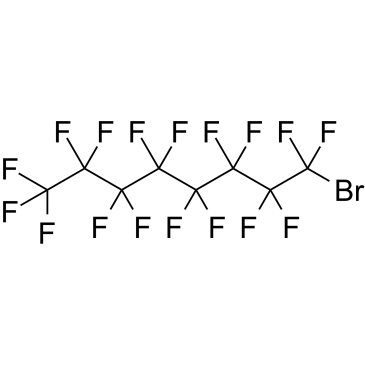
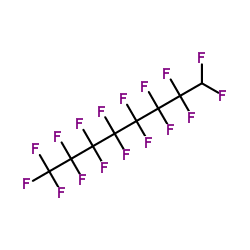
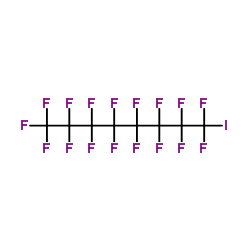
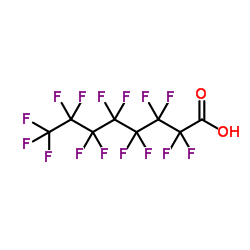
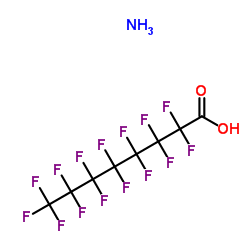

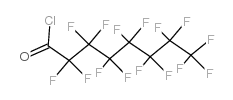 CAS#:335-64-8
CAS#:335-64-8 CAS#:355-63-5
CAS#:355-63-5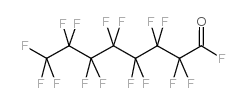 CAS#:335-66-0
CAS#:335-66-0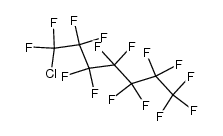 CAS#:375-89-3
CAS#:375-89-3 CAS#:375-84-8
CAS#:375-84-8
